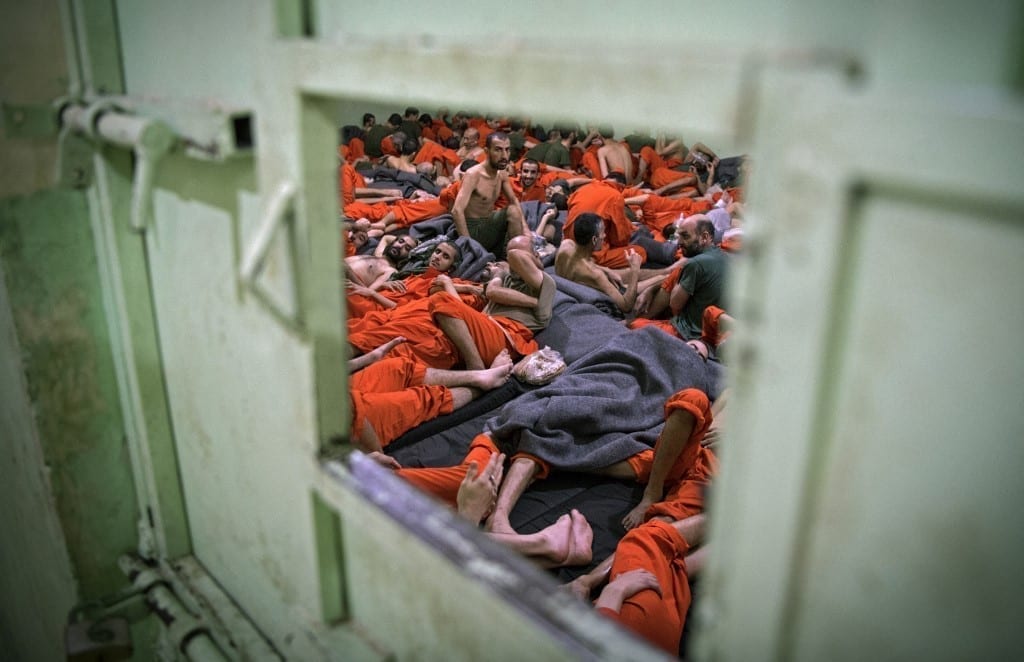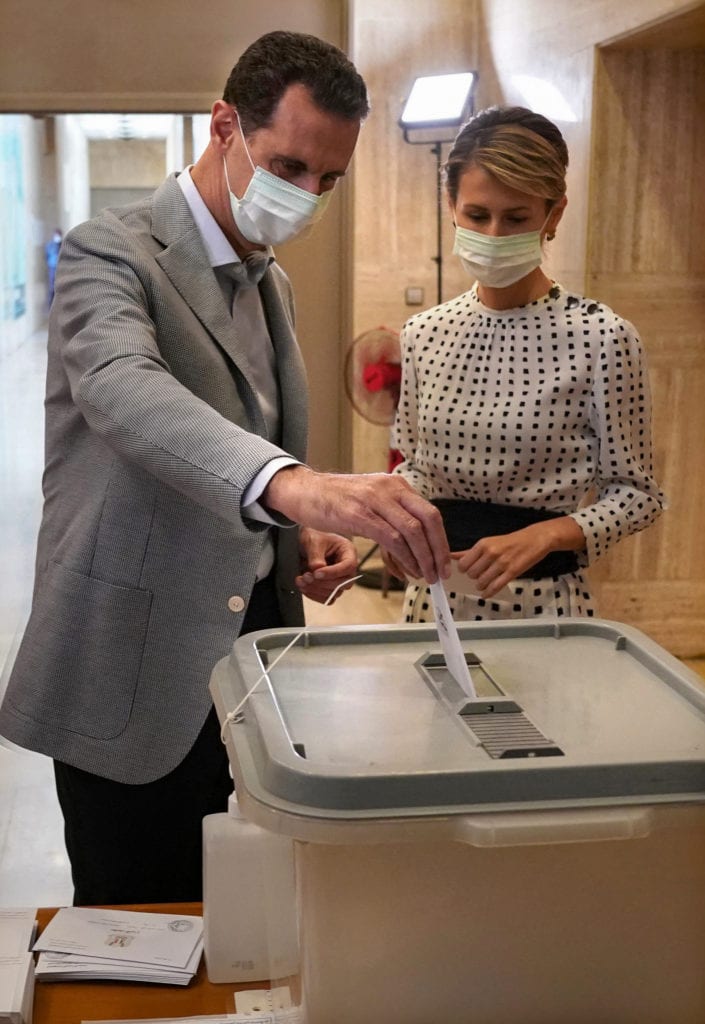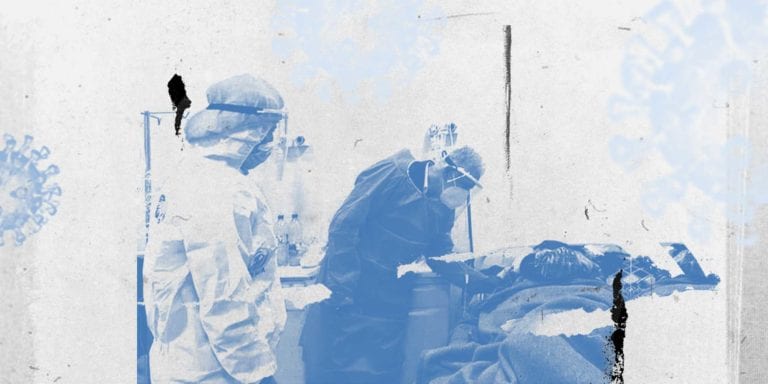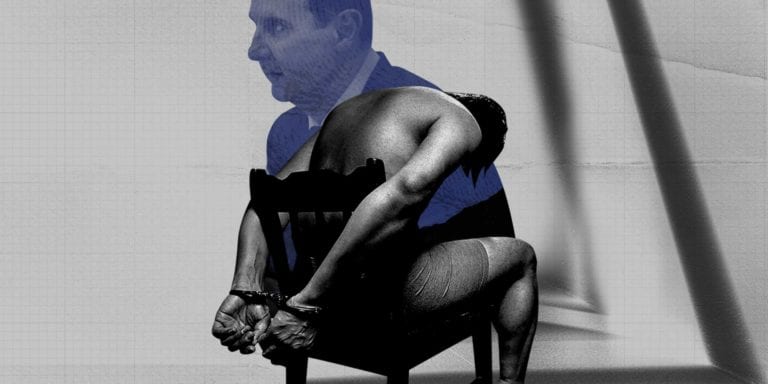Since I left Syria to live in exile, I have come to fear the dreams and nightmares from which I wake up to the sound of my own screams. This despite the fact that I am very busy studying French and completing my studies that I lost in the country of losses.
I used to think that, when we move away from what harms us, we will forget. Yet, the problem is that what harms us is still on the loose, free to target people no longer able to even secure a livelihood.
Seven years have passed since I got out of that cell, which taught me some lessons that, however harsh, should be written on the walls of every major city and capital in the world, so that tourists could see them and be amazed by our strength and the fact we were able to get out of the Holocaust into the world.
On the ground nothing has changed in Syria. It has only gotten worse 10 years after the revolution. The opposition did not stay true to its word and the demands of the people, shattered between displacement, asylum and death, were never fulfilled. This year the presidential elections take place, in which the sole hero is the great leader. This is what brought me back to that very first scene.
How It All Began
On April 13, 2014, I was on board of a Ilyushin cargo plane being transferred from the Military Security Branch in Deir El Zor to the Palestine Branch in Damascus. We were 24 detainees. All were handcuffed by a long metal chain. Except me. As I was the only girl, I was handcuffed separately with a plastic manacle.
Upon arrival at the Palestine Branch, a guard took me to the female section. He told me to turn to the wall, as he started looking for a place for me to sleep. He then told me to enter a small room, which was the smallest dormitory in the whole prison.
It contained 17 women in an area of not more than six meters wide. The detainees used to sleep on one side with the head of the one facing the feet of the other. At night I would hear them snore.
I knew then that everyone had serious sleeping problems. That first night I cried nonstop. I sat crosslegged – a punishment my body still carries today – waiting for the morning, and maybe a space to stretch my legs.
When everyone had woken up, including the guard who spent the night in a deep sleep on his military bed with no one to share, the dormitory door would open to let us out for a morning walk to the bathrooms. It was the only place from where we, through a window high above, could catch a glimpse of the sky.
I did not know the Palestine Branch was the last transit station on the route between the many Syrian security branches. I entered room No. 7. I stood at the doorstep as if I knew it. We were all strangers: them and I, the prison, the jailer and the leader who joined us together.

I looked with great sadness at the many elderly women, who did not know why they had been arrested. I wondered about their significance. I wondered whether the world knew about Sabouha, a woman who shivers upon the touch of cold water, whose body trembles when she talks. Ask her how old she is and she replies: “I’m 35.” Sabouha forgot her age, her youth spent in Hama, the city slain at the hands of old Assad, as she spends her days in his son’s prisons.
Prison Walls
The walls of our cell were filled with Quranic verses. How were the detainees able to write all these verses on the walls, I asked myself. Is it not forbidden? Since the beginning of the revolution, and to this very day, anyone writing on Syrian walls has been arrested and tortured.
During my detention in the Military Security Branch and Palestine Branch, I came across underage girls, some of whom were detained not because of any activity in the revolution. They were there for no reason. Only in the prisons of the Assad family you do not know why you are there.
I looked with great sadness at the many elderly women, who did not know why they had been arrested. I wondered about their significance. I wondered whether the world knew about Sabouha, a woman who shivers upon the touch of cold water, whose body trembles when she talks. Ask her how old she is and she replies: “I’m 35.”
The detainees would talk about their release and how they would not tell their relatives about their detention. “When we get out, we tell them that we were on a trip or that we ran away to somewhere,” they used to say.
I did not understand why at first, but after a while I understood that women in our societies do not have any options. Rather, they are wronged several times. During the revolution they were wronged both inside and outside the prison. Some were abandoned by their families and stigmatized.
As for me, I was lucky that my family would not abandon me. I used to tell myself this, because they knew that I was not on a trip and that I did not run away with a man. Love united us before ISIS killed him one time, as I was killed by Assad and Al-Baghdadi a thousand times.
Being in room No. 7, I was a bit more optimistic because of the larger area. I wanted to have a place of my own, so that I could sleep the way I wanted to. Room No. 7 was very large compared to the first one, but there were some 54 female detainees, each of whom dreamt of getting her own space in and outside of this place.
“Girls, who amongst you came last?” the female sergeant asked loudly. “Me,” I replied. “Then you will sleep at the door,” she said. “This place is reserved for anyone whom comes last.”
I shook my head as a sign of approval. I could not object. My only hope was to fall asleep without having to wait for one of the others to wake up. I tossed my bag of clothes on the ground. I looked at my new place. I would be able to lie on my back! Sometimes that is a luxury!
There were other things, like the bucket used as a substitute for the toilet, in case we were not allowed to go to or in case there was an urgent need. I prepared myself to get used to the smells emanating from the bucket and from the ones using it. I had to.
I also spent a long time training myself to keep my hair fully covered, so that the lice would not invade it. This tiny insect shared the harshness of life with us, and made our bodies and heads a place to sleep and settle. We were all dressed from head to toe, fearing for our wounds and bodies, and that little insect.
I used my bag as a pillow and spent the first night in room No. 7 looking at the walls covered with Quranic verses. I started reading everything so that I could fall asleep. In fact, inside the prison we all got closer to God, closer to our inner solitude.
I wanted to write the women’s stories on the walls, but I still had not got rid of the phobia of the blackboard. I hated it, because of my teacher, an officer’s wife, who punished us whenever we misspelled a word. I remembered one night when she allowed the brightest students to hit us, because we had not memorized our lessons. I realized belatedly, that our schools were also detention centers, and the officer’s wife was like a policeman.
A Terrorist Cell
On TV and in other pro-government media we always heard the same sentence that is still repeated today: “The Syrian Arab army dismantled a terrorist cell.”
But inside room No. 7, I got to know the true terrorist cell, as I looked with great sadness at the many elderly women, who did not know why they were arrested and why the regime was afraid of them.
That day several questions crossed my mind, such as: does Lakhdar Brahimi, the veteran diplomat know we are being hit with a device bearing his name? That it hurts us a lot? Did Kofi Annan know that Assad’s executioners named a stick wrapped with black tape after him, which was used to torture detainees?
The stories of the women inside room No. 7 are never ending. Whenever women leave, they bring in others to carry on the stories, and the crimes of the Assad family. One afternoon a girl in her 30s entered the room and sat down in the middle.
A silence fell, as if the angel of death had strangled our breath. She broke the silence, by saying: “My name is Rana. I was detained by the Fourth Division.”
“Have you come just now, or have you been here forever?” Umm Mohamed the Lattakian asked her. “No, I just arrived,” she replied.
Rana asked if we could take a shower or go to the bathroom. The female sergeant told her that we bathe in hot water once a month, and go to the bathroom three times a day. When we cannot there is the bucket.
Rana said she had not had a shower for nearly a month, and that she needed clean clothes and soap. Her clothes were dirty, because she had had her period, and had not received any feminine pads. This is yet another way to torture women.
Not Forgotten
A month passed and I somehow got used to the situation. I spent my time listening to the women’s stories, inventing jokes and pleasantries to relieve the pain, watching time pass by at a glacial pace.
No one called me. I was afraid to be forgotten, like so many other forgotten detainees. I hastened to forget the phrase I had read on the stairs about the Palestine Branch: “Who gets in is missing and who gets out is reborn.”
After 30 days in room No. 7 the door opened in the afternoon. The jailer called me for an interrogation. I jumped up at the back of the room and accidentally stepped on someone’s foot. I was just glad they had not forgotten me.
How naive are the moments of joy in a country ruled by tyrants …
I stood inside the dimly lit interrogation room. It was very narrow. I did not know that we were facing a housing crisis inside Syria’s prisons until I set foot in this place and learnt there are more people inside than outside.
The officer started reading my file, turning over papers, and questioning me. I could not find the answer that suited him, which provoked him. “Stop fooling around, bitch,” he shouted, and then hit me on my hand with the “Lakhdar Brahimi.”
Rana said she had not had a shower for nearly a month, and that she needed clean clothes and soap. Her clothes were dirty, because she had had her period, and had not received any feminine pads. This is yet another way to torture women.
Pasta
Azrael, the angel of geath, who separates body and soul, visited once. But he did not take my soul. That day I ate the pasta with tomato sauce they offered us sometimes. It is a nasty meal not suitable even for animals.
I washed the sauce off it, put a little salt and ate it. I thought it might be a cleaner, but I was wrong. My belly hurt like hell, I felt nauseous, and then I started vomiting to the point of suffocation. There was no window, yet there was a pipe through which some fresh air entered. I sat underneath trying to breathe.
I remember the female sergeant started waving at the security camera in order to get help. When they opened the door they told me to go to the doctor. Yet, when he saw me he told me: “There’s nothing wrong with you. You’re as fit as a fiddle.”
But I know I saw Azrael that day. And yet I still love pasta.
28 days after my first interrogation we learnt from the new detainees entering that the Bashar Al Assad elections had begun, so our number was declining during that period. No one knew whether the detainees were being released or transferred. I moved to a bed in the front, where I had enough space to turn on both sides.


One night I had a strange dream. In the morning I rushed to the bathroom to tell my friend Wafaa about it. Perhaps she would know what it meant. “I think you will get out on May 31,” she said. That was in three days! A glimpse of hope loomed on the horizon!
That same evening, the prison director opened the door and called out some names. I heard my name. My heart started pounding. I looked at Wafaa and smiled. Perhaps she was right. However, the prison director saw me smiling and he did not like that. “Rest assured you will stay here,” he said.
The Last Day
The next day I entered my second interrogation. They had changed the officer in charge. He started asking me questions, but I could not answer him. Not because I did not know the answer, but there was something on my mind.
I had seen the young man in the corridor. An officer caught him and hit him on his head. Blood splattered against the walls. I was not hit or cursed that day, but the young man ached my heart.
The last day finally came. I woke up in the morning with my friends and my my blue ink pen, which I had stolen from the Military Security Branch. I had been able to enter it into the Palestine Branch by hiding it in my shoe.
In the bathroom, I wrote down the phone numbers of family members of some of the detainees, in case I were to leave prison that night. I was not sure I would, but just in case. The afternoon passed, yet no one called. Despair defeated me, and I fell in a deep sleep.
I woke up to the voice of the women around me. “Ruqayya, Abu Ali Hilweh tells you to take your things and get out.”
I did not understand what was happening as my brain was still asleep. I thought Azrael was back. I went to see Abu Ali, came back, sat in my place and woke up from my coma. I gathered my clothes and ran out.
It was late, half past nine in the evening, I had heard the guards say, as I was waiting in the corridor. An officer came, asked me to sign some paper and took me outside. I imagined I would be transferred to one of the new security branches. I did not understand anything of what was happening. And I could not ask, until I reached the office of a senior officer who said: “You will be released now.”
My freedom returned to me! This is what I told myself. I hid my joy out of fear for committing a new charge in a country that kidnaps joy. After I got out, I learnt that my father had paid a large sum of money.
When I exited the Palestine Branch, the first thing I saw was the thugs’ cars with their pictures of the great leader playing his songs. They were everywhere in the streets of Damascus, as the elections had started. But who will vote for the great leader, I wondered, when half of the people are in detention centers and the other half is trying to escape from hell?
Inside the car that took me to the Ministry of Justice were two men. They did not talk to me at first. Then one of them asked me: “You want to go back to the university and stop opposing the regime?”
I told him that I could not. I was thinking of returning to my village, my family and my revolution. But later I learnt that ISIS had taken control. Another battle had begun, and a new type of prison and torture had started. I decided to leave Syria.
Yet the ghost of Azrael is still haunting me …
Read Also:








